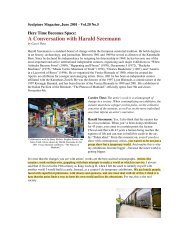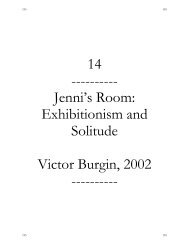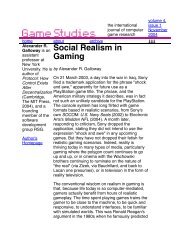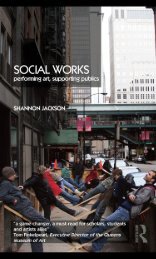Untitled
Untitled
Untitled
You also want an ePaper? Increase the reach of your titles
YUMPU automatically turns print PDFs into web optimized ePapers that Google loves.
Beyond Diversity: Cultural Studies and Its Post-Communist<br />
Other<br />
One can safely say that the cultural situation in the countries of post-<br />
Communist Eastern Europe is still a blind spot for contemporary cultural<br />
studies. Cultural studies has, that is, some fundamental difficulties in describing<br />
and theorizing the post-Communist condition. And, frankly, I do<br />
not believe that a simple adjustment of the theoretical framework and vocabulary<br />
of cultural studies to the realities of Eastern Europe—without reconsideration<br />
of some of the discipline’s fundamental presuppositions—would be<br />
sufficient to enable its discourse to describe and discuss the post-Communist<br />
reality. I will now try to explain why such an adjustment seems to be so<br />
difficult.<br />
The currently dominant theoretical discourse in the field of cultural<br />
studies has a tendency to see historical development as a road that brings the<br />
subject from the particular to the universal, from premodern closed communities,<br />
orders, hierarchies, traditions, and cultural identities toward the open<br />
space of universality, free communication, and citizenship in a democratic<br />
modern state. Contemporary cultural studies shares this image with the venerable<br />
tradition of the European Enlightenment—even if the former looks at<br />
this image in a different way and, accordingly, draws different conclusions<br />
from the analysis of this image. The central question that arises under these<br />
presuppositions is namely the following: How are we to deal with an individual<br />
person traveling along this road—here and now The traditional<br />
answer of liberal political theory, which has its origins in French Enlightenment<br />
thought, is well known: the person on this road has to move forward<br />
as quickly as possible. And if we see that a certain person is not going fast<br />
enough—and maybe even takes a rest before moving ahead—then appropriate<br />
measures must be taken against this person, because such a person is<br />
holding up not only his or her own transition but also the transition of the<br />
whole of humankind to the state of universal freedom. And humankind<br />
cannot tolerate such slow movement because it wants to be free and democratic<br />
as soon as possible.







